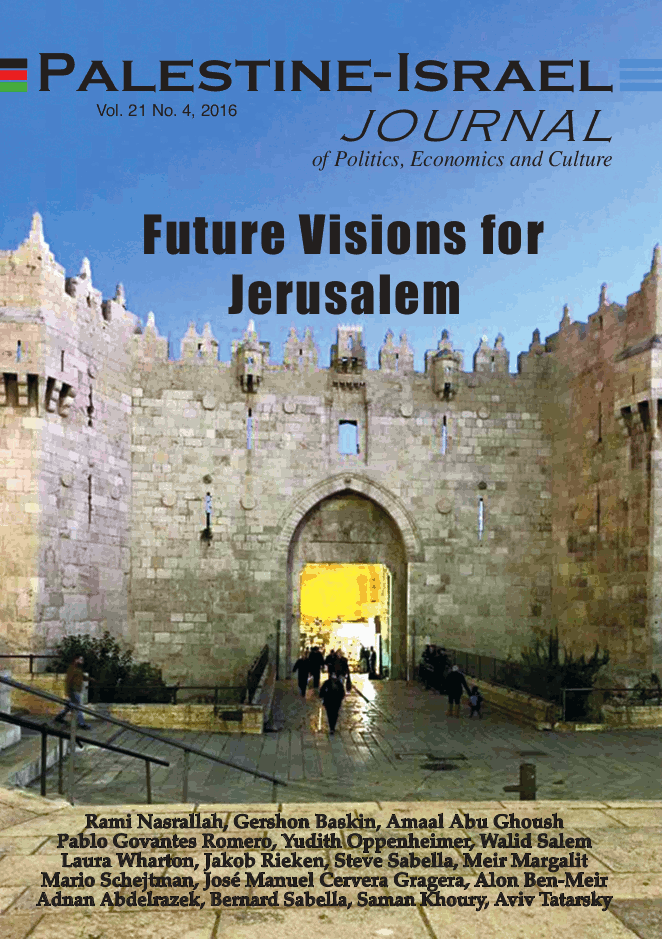Jerusalem is a unique city where things today look calm and quiet, while beneath the calm conflicting streams run strong and fast. This reality is witnessed by anyone one who tries to examine things in depth or has the opportunity to live in East Jerusalem and taste the social and political flavor of the ongoing occupation and conflict. In spite of the fact that in six months the city will commemorate the 50th year of Israeli occupation, nothing has changed in the attitude of its population vis-à-vis the Israeli occupation and authorities. Five decades of occupation and intensive efforts to liquidate the Palestinian identity of the city have failed. Israeli discriminatory policy against the Arabs in the cityalongside the fanatic Jewish religious groups efforts to change the status of al-Aqsa Mosque/ al-Haram al-Sharif/ the Temple Mount is fueling the feelings of hatred and heating up the confrontation at the national-political level between the Israeli occupation forces and the Palestinians, and on the individual level between Arabs and Jews.
This confrontation had escalated in the last few years after the burning alive of the 16-year-old Mohammed Abu Khdair from Shu’fat neighborhood by Jewish fanatics and the protests which followed. This escalation was fed by the right-wing Jewish attempts to hold Jewish religious ceremonies in al-Haram al-Sharif, the Israeli police imposition of age limits on Muslims who can pray at the site, thus preventing young persons from worshipping, and the brutal treatment of female worshippers at the gates of the Mosque, which led to a wave of stabbings against Jews and heated up the situation to unprecedented levels.
The current right-wing Israeli government, instead of trying to calm down the situation, is intensifying its efforts to change the image of the city for the benefit of the Jews. It is supporting and encouraging attempts to demonstrate Jewish presence in al-Haram al-Sharif, and supporting increased settlers’ outposts inside the Arab neighborhoods of East Jerusalem. The Israeli Interior Ministry is preventing family unifications and imposing strict measures against Arabs in their dealings with the Ministry in all matters related to their daily family affairs. While the Municipality is accelerating house demolitions, raising the municipality tax (Arnona), and making the onerous process of obtaining building permits even more difficult for Arabs, similar obstacles and harsh treatment of Arabs are being adopted by the National Insurance authorities. These practices are exacerbating the conflict and adding fuel to the fire.
Ignoring the Palestinian presence and their rights in Jerusalem and converting the city into a Jewish one will not help the goal of ending the occupation and achieving a political resolution to the Israeli-Palestinian conflict as a major component of peace and stability in the Middle East. On the contrary. Israelis who are rejoicing about the possibility that the new U.S. administration led by the President-elect Donald Trump might move the American Embassy to Jerusalem should understand that any unilateral step in Jerusalem will not only undermine the two-state option and the possibility of resolving the conflict politically, but will lay the foundation for an apartheid regime — leading, after a long period of suffering and bloodshed on both sides, to a bi-national state.
In such an atmosphere, the Palestine-Israel Journal, jointly with the Israeli NGO Ir Amim, has carried out the first two years of a project to empower young leaders from both sides through training and political seminars on how to cope with this situation from within. Our aim is to maintain the possibility of resolving the conflict on the basis of sharing Jerusalem as the two capitals for the two states: Israel and Palestine along the 1967 lines. As part of the project, in this issue of the Palestine Israel Journal, we examine the future visions for Jerusalem and the impact of the current course of events on the future of Jerusalem in specific and the conflict in general, providing a platform for a number of distinguished Israeli, Palestinian and international experts to give their views on this topic.

